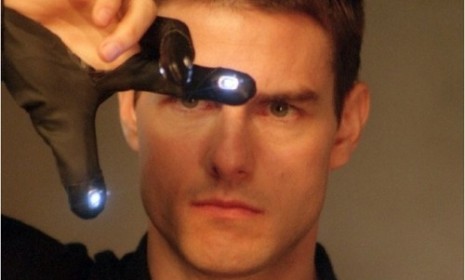Florida's 'Minority Report' crime prediction software
Florida has adopted forecasting software, produced by IBM, to target high-risk youths. Is this the beginning of a "Minority Report" future?

A free daily email with the biggest news stories of the day – and the best features from TheWeek.com
You are now subscribed
Your newsletter sign-up was successful
Florida's Department of Juvenile Justice isn't satisfied with solving crimes today — it wants to predict which young offenders are most likely to break the law in the future. The state plans to use cutting edge computer programs to identify at-risk teenagers and use counseling and other targeted interventions to keep them within the law. Some critics say the idea sounds frighteningly similar to the freedom-crushing system for fighting future crime in the 2002 science fiction movie Minority Report. Here's a brief look at how Florida plans to stop crime before it happens, and the ethics of bringing sci-fi ideas into the real world:
How does the Florida project work?
It uses IBM predictive analytics software — similar to programs credit agencies use to determine your credit score and retail chains use to predict what you'll want to buy. In Florida, a version of the software modified for police and other government organizations will look at a youth offender's criminal history, home life, drug use, gang affiliation, and other criteria to determine the likelihood any given teen offender will return to crime in the future.
The Week
Escape your echo chamber. Get the facts behind the news, plus analysis from multiple perspectives.

Sign up for The Week's Free Newsletters
From our morning news briefing to a weekly Good News Newsletter, get the best of The Week delivered directly to your inbox.
From our morning news briefing to a weekly Good News Newsletter, get the best of The Week delivered directly to your inbox.
What good will that do?
Florida officials say they'll be able to cut down on the 85,000 juveniles who enter the state's criminal justice system each year, by steering high-risk youths into treatment, intervention, and other rehabilitation programs. The state used to keep all this data on Excel spreadsheets, but that was only good for looking "in the rearview mirror," says department research and planning chief Mark Greenwald. Despite the potential benefits, though, not everyone is sold on the idea.
Why not?
To some people, it just sounds creepy. Several commentators have noted the Florida program's similarity to the "Precrime" police unit in the 2002 sci-fi movie Minority Report (and the 1956 Philip K. Dick story it's based on). This may start with "convicted-but-potentially-recidivistic criminals," says Jesus Diaz at Gizmodo. But soon all of us could easily be in a big government database, with our activities catalogued to see if "we may be thinking about doing something against the law." Preventing crime sounds good, he adds, but "one single false positive would make the whole system unfair" — which is why the Constitution gives us due process rights and the presumption of innocence.
A free daily email with the biggest news stories of the day – and the best features from TheWeek.com
So is Florida alone in thinking this is a good idea?
No. Britain's Ministry of Justice recently purchased IBM's predictive analytics program to determine the likelihood that 3.4 million adult prisoners will relapse into crime after their release, and at least one British public school system is using the software to pick out students at risk of bullying, blackmail, and violence. And IBM is convinced Americans are ready for the change, too. Thanks to TV shows like CSI, says IBM predictive analytics expert Erick Brethenoux, people increasingly "accept the fact that you can solve crimes in labs."
Sources: Government Technology, Gizmodo, GigaOm, The Register
-
 The Olympic timekeepers keeping the Games on track
The Olympic timekeepers keeping the Games on trackUnder the Radar Swiss watchmaking giant Omega has been at the finish line of every Olympic Games for nearly 100 years
-
 Will increasing tensions with Iran boil over into war?
Will increasing tensions with Iran boil over into war?Today’s Big Question President Donald Trump has recently been threatening the country
-
 Corruption: The spy sheikh and the president
Corruption: The spy sheikh and the presidentFeature Trump is at the center of another scandal